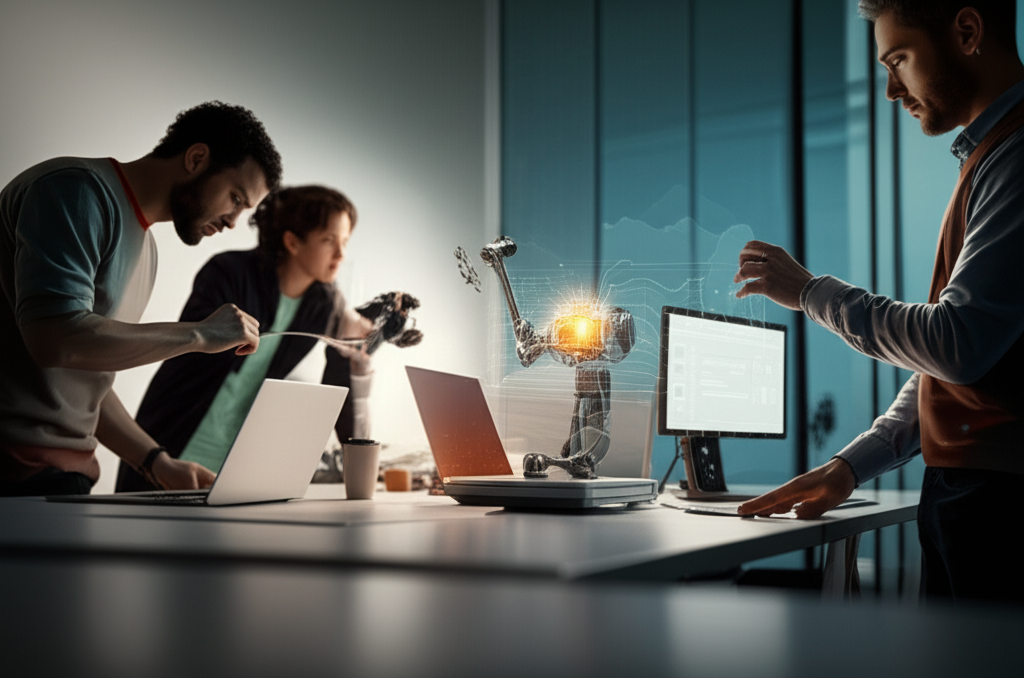
AI Winter is Over?! The Unexpected Boom of 2025
The whispers of an AI winter, a chilling period of disillusionment and stalled progress, have melted away under the scorching heat of innovation. No longer a distant promise, artificial intelligence has woven itself into the fabric of our daily lives, sparking an unprecedented AI boom. The year 2025 is shaping up to be a pivotal moment, a time when AI transcends its theoretical potential and becomes a tangible force reshaping industries, societies, and even our understanding of what’s possible.
The Catalysts Behind the AI Boom
Several factors have converged to fuel the current AI surge. These aren’t isolated incidents, but rather interconnected trends that reinforce and amplify each other.
– Increased Computing Power: Moore’s Law may be slowing, but advancements in specialized hardware, particularly GPUs and TPUs, have provided the computational muscle needed to train increasingly complex AI models.
– Data Abundance: The digital age has left us awash in data, the raw material that feeds AI algorithms. As we generate more data, AI systems become more refined and capable.
– Algorithmic Breakthroughs: From transformer networks to reinforcement learning, researchers are constantly developing new and improved algorithms that unlock new possibilities for AI.
– Democratization of AI Tools: Cloud platforms and open-source libraries have made AI tools and resources accessible to a wider audience, empowering developers and entrepreneurs to experiment and innovate.
The Role of Investment in Driving AI Forward
Beyond the technological advancements, massive investments from both private and public sectors have played a crucial role. Venture capitalists are pouring billions into AI startups, while governments worldwide are launching initiatives to promote AI research and development. This influx of capital fuels innovation, attracts talent, and accelerates the adoption of AI technologies across various sectors.
Industries Reimagined: The Impact of AI Across Sectors
The AI boom isn’t confined to the tech industry; it’s revolutionizing virtually every sector of the economy.
– Healthcare: AI is assisting in diagnosis, drug discovery, personalized medicine, and robotic surgery, leading to better patient outcomes and more efficient healthcare delivery.
– Finance: AI is used for fraud detection, risk management, algorithmic trading, and personalized financial advice, enhancing security and efficiency.
– Manufacturing: AI-powered robots and automation systems are optimizing production processes, improving quality control, and reducing costs.
– Transportation: Self-driving cars, drone delivery, and intelligent traffic management systems are poised to transform the way we move goods and people.
– Retail: AI is powering personalized recommendations, targeted advertising, and automated customer service, enhancing the shopping experience and driving sales.
Addressing the Ethical Considerations of the AI Boom
The rapid advancement of AI raises important ethical questions that must be addressed proactively. As AI systems become more sophisticated, it’s crucial to consider their potential impact on society and ensure that they are used responsibly.
– Bias and Fairness: AI algorithms can perpetuate and amplify existing biases in data, leading to discriminatory outcomes. It’s essential to develop methods for detecting and mitigating bias in AI systems.
– Transparency and Explainability: Many AI models, particularly deep learning networks, are “black boxes” whose decision-making processes are opaque. Making AI systems more transparent and explainable is crucial for building trust and accountability.
– Job Displacement: The automation potential of AI raises concerns about job displacement. Preparing the workforce for the future of work by providing training and education in AI-related skills is crucial.
– Privacy and Security: AI systems often rely on vast amounts of personal data, raising concerns about privacy and security. Implementing robust data protection measures and ensuring responsible data handling are essential.
According to a report by McKinsey, AI could contribute up to $13 trillion to the global economy by 2030. However, realizing this potential requires addressing the ethical challenges and ensuring that AI benefits all of society.
Navigating the AI Boom: Strategies for Businesses and Individuals
Whether you’re a business leader or an individual, understanding and adapting to the AI boom is essential for success in the years to come.
– Businesses should:
– Identify opportunities to leverage AI to improve efficiency, enhance customer experiences, and create new products and services.
– Invest in AI training and education for their employees to equip them with the skills needed to work alongside AI systems.
– Develop a clear AI strategy that aligns with their overall business goals and values.
– Prioritize ethical considerations and ensure that their AI systems are used responsibly.
– Individuals should:
– Develop their AI literacy by learning about the basic concepts and applications of AI.
– Acquire skills in AI-related fields such as data science, machine learning, and software engineering.
– Embrace lifelong learning and be prepared to adapt to the changing demands of the job market.
– Stay informed about the ethical implications of AI and advocate for responsible development and deployment.
The Future of AI: A Glimpse into the Next Decade
The AI boom is just the beginning. As AI technology continues to evolve, we can expect to see even more transformative changes in the years to come.
– Artificial General Intelligence (AGI): While still largely theoretical, AGI, or human-level AI, remains a long-term goal for many researchers. Achieving AGI would have profound implications for society.
– AI-Driven Creativity: AI is already being used to generate art, music, and literature. In the future, we may see AI systems that can create original works that are indistinguishable from those created by humans.
– Personalized AI Assistants: AI assistants will become more personalized and proactive, anticipating our needs and providing tailored assistance in all aspects of our lives.
– AI for Social Good: AI will be increasingly used to address some of the world’s most pressing challenges, such as climate change, poverty, and disease.
The unexpected AI boom is transforming the world around us at an unprecedented pace. To fully capitalize on this technological revolution and ensure a beneficial outcome for all, a balanced perspective is required, one that combines innovation with ethical mindfulness.
For more insights or collaboration opportunities, visit www.agentcircle.ai.






